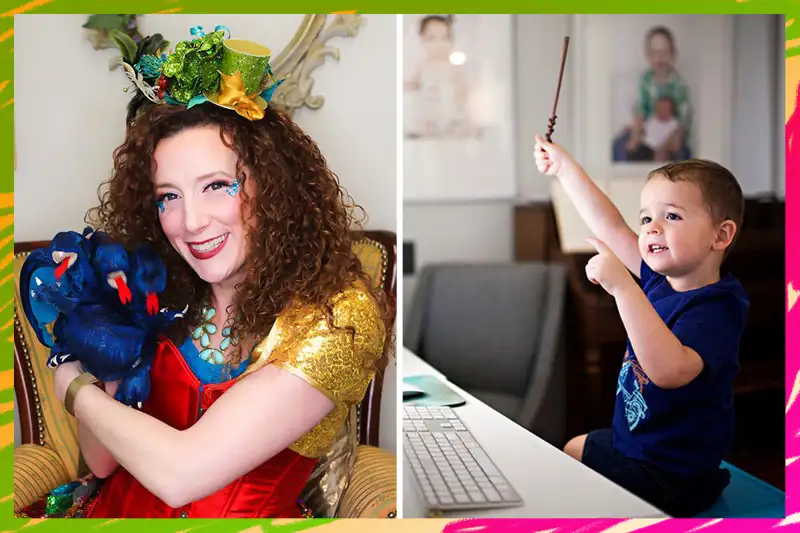How I Saved My Small Business: A Fairy-for-Hire Goes Digital to Keep Kids Entertained During Quarantine

Fae Gershenson got her first phone cancelation on March 1. Ten days later, it stopped ringing altogether.
“That was our realization that everything was falling apart,” she says. “It was terrifying.”
Gershenson — a.k.a. “Fae Diddle Diddle” — owns Happily Ever Laughter, a children’s entertainment company that, for the last 14 years, has sent taffeta-clad fairies of all stripes (Autumnal! Tooth! Holiday!) to birthday parties, strip malls and amusement parks across greater California.
Word of mouth and a rotating crew of theater students have helped her company grow from a one-woman endeavor to a 50-fairy outfit that pulls in more than $1 million in sales every year, she says. But like many small business owners, Gershenson’s bottom line was dealt a mighty blow by the coronavirus pandemic. By mid-March, every booking on her calendar was gone — along with an entire season’s worth of business.
Gershenson was on the cusp of losing everything — her livelihood, her employees, her life’s passion. But she refused to go down without a fight.
So a few weeks after that first cancelation, Gershenson invited Happily Ever Laughter’s creative director, Meadow Fichera, to her Santa Cruz home. A couple hours and “too many Red Bulls” later, they came up with an idea to save Happily Ever Laughter from a death spiral.
And it worked like magic.
Find — and fill — a new need
In any normal year, when a deadly respiratory illness isn’t wreaking havoc on every aspect of American life, Happily Ever Laughter’s fairies are highly sought-after performers.
Gershenson has a tight-knit crew of employees, she says, every one of which has an almost preternatural talent for using magic tricks, balloon animals, and gallons of bubbles to connect with children. To keep her business afloat mid-pandemic, she knew she’d have to figure out how to keep that momentum going digitally.
First, she bought all the usual “pivot to video” accoutrements — backdrops, cameras, lights — and worked one-on-one with performers to learn how to stream magic into people’s homes via Zoom call.
Then she got the word out.
Social distancing, and the forced marriage of homeschool and remote work it sprung on families, has made lots of cabin-fevered quarantiners desperate for a parenting break. So after Gershenson’s team blasted an email and social media campaign out to parents, letting them know that her fairies could tag in for a couple hours, business started booming again.
Happily Ever Laughter’s “online playdates” don’t look all that different from its in-person ones. There’s still glitter. And wands. And puppets.
But after a few early trial runs, Gershenson tweaked the company's approach and decided to bring parents into the fold too.
Now, before each digital booking, Happily Ever Laughter ships mom and dad a gift to hide — like a stuffed animal or puppet. Then, during the call, her fairies use “magic” (and a duplicate toy) to make it disappear off the screen and into the child’s home. (It’s really cute).
“Once that started happening, everything broke open,” Gershenson says. “Children would talk about us for weeks. Many families have had us for 5, 6, 7 times already.”
Brace for new challenges
To make virtual magic, Gershenson needed to be pragmatic.
She applied for, and received, two government loans: the CARES act-funded Paycheck Protection Program (PPP) and the Economic Injury Disaster Loan and Advance (EIDL). Before any of that, though, she made it a point to call the customer service lines for every debt Happily Ever Laughter owed —from the phone bill to the software company that runs her marketing analytics—and either asked for a payment extension or canceled the service altogether.
Gershenson is still sorting some things out. Virtual performances don’t command the same rates as in-person ones, so she’s had to rework her balance sheet (Happily Ever Laughter charges $69 per video appearance, less than a third of its regular $285 fee).
The mechanics of bringing performers online has also been tricky. Ask anyone who’s been on a Zoom call with a bad connection, or FaceTimed with a bad pimple: Being the center of virtual attention isn’t immediately intuitive. For Gershenson’s fairies—who are supposed to be dialing in from a magical utopia far, far away—shoddy wifi, loud neighbors, and errant pets are even less forgiving.
“The only way it works is to keep company morale up, and having a consistent message to employees about why we’re doing this,” Gershenson says.
That message?
“Children are terrified right now. Let’s make them laugh.”
Decide what comes next
As California reopens, and Gershenson starts sending fairies back into people’s homes, there’s a laundry list of new hurdles to contend with.
Social distancing makes hugs, high-fives, and other kid-enchanting pursuits a no-go for the foreseeable future. (“You can’t blow bubbles anymore,” she says. “There was a huge scream in the office when that announcement was made.”)
To protect staff, she’s building a temporary fortress of gold flags around in-person performers, and asking parents to try and keep fairy-hosted gatherings between family members, or have guests bring along a beach blanket (or a “magic carpet”) to mark each kid’s designated six-foot space.
Gershenson doesn’t anticipate doing away with Happily Ever Laughter’s video endeavors anytime soon.
In the coming months, she’ll nix corporate contracts with malls, theme parks, and cruise lines (once a big money maker for her team) and tailor her services to children struggling to connect with long-distance relatives, classmates, and friends.
After all, digital performances can take place literally anywhere — and summer travel restrictions aren’t making grandma and grandpa any less eager to see their grandkids.
A fairy-hosted virtual hang, Gershenson reasons, could be the perfect solution.
“I’m crossing my wings,” she says.
More From Money:
For Small Businesses, Getting a PPP Loan Is Hard. Using It Is Even Trickier
Here's a State-by-State Breakdown of PPP Funding — And How Far it Went
